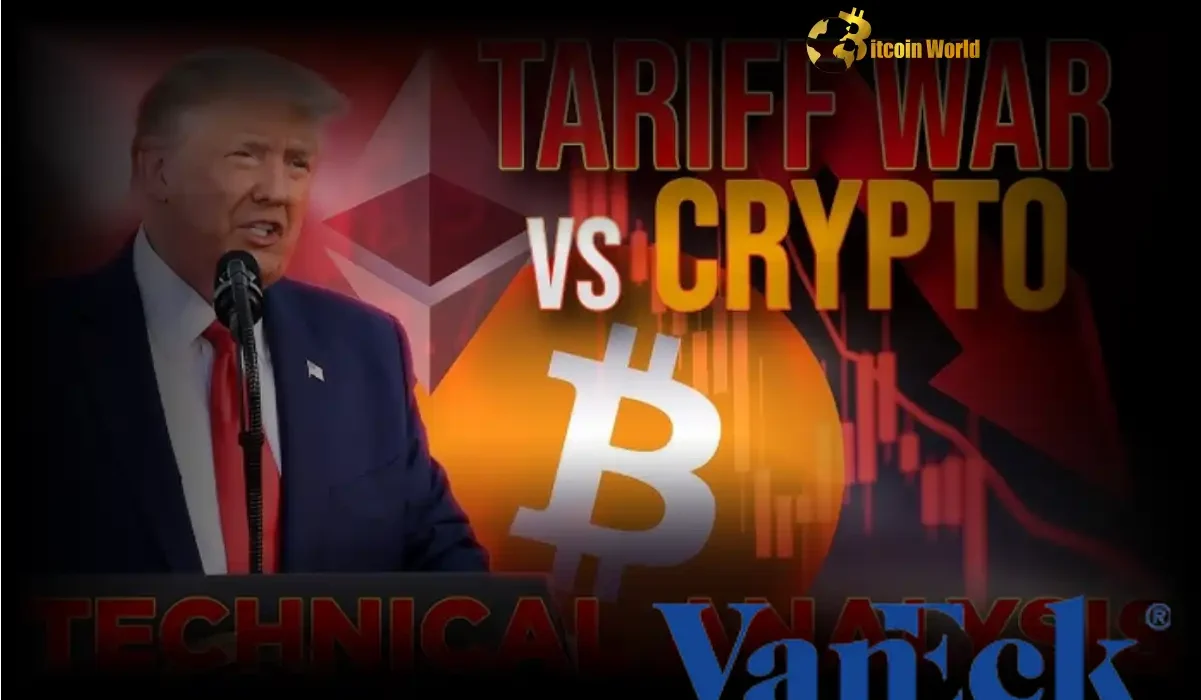Are you prepared for a seismic shift in global finance? The escalating trade tensions led by the U.S. are not just reshaping international commerce; they’re inadvertently fueling a surge in crypto payment adoption. VanEck, a well-regarded investment management firm, has released a compelling report highlighting this unexpected consequence of tariff wars. Let’s dive into how these global economic pressures are pushing nations and businesses towards cryptocurrencies like Bitcoin.
Why Tariff Tensions Are a Catalyst for Crypto Payment Adoption?
The core of the issue lies in the disruption of traditional financial systems. When countries impose tariffs and engage in trade disputes, the stability of fiat currencies can be called into question. VanEck’s report suggests that this instability, coupled with a desire to circumvent traditional financial rails, is making crypto payment adoption increasingly attractive. Think of it as a financial detour around roadblocks erected by trade wars.
Here’s a breakdown of the key factors at play:
- Dollar Weakness: Continued uncertainty and trade imbalances can lead to a weakening U.S. dollar, the world’s reserve currency. This makes alternative assets, including cryptocurrencies, more appealing as stores of value and mediums of exchange.
- Geopolitical Fragmentation: As global alliances shift and trade blocs realign, countries are seeking financial independence. Cryptocurrencies offer a decentralized, borderless solution that sidesteps traditional geopolitical constraints.
- Sanctions and Restrictions: Tariff wars often go hand-in-hand with sanctions. Cryptocurrencies can provide a route for nations and entities to conduct transactions outside the reach of these restrictions.
- Desire for Alternatives: Businesses and individuals caught in the crossfire of trade disputes may actively seek alternative payment systems to mitigate risks and ensure smooth transactions.
Bitcoin: The Unexpected Beneficiary?
While the cryptocurrency landscape is vast, Bitcoin is emerging as a primary beneficiary of this trend. Its established network, decentralized nature, and increasing acceptance as a store of value position it uniquely in this evolving scenario. VanEck’s report highlights specific instances where Bitcoin is gaining traction due to tariff-related pressures.
Examples from the Report:
- China and Russia Energy Deals: Watcher Guru’s report on X indicates that China and Russia are reportedly utilizing cryptocurrencies for some energy transactions. This could be a strategic move to bypass dollar-denominated systems and mitigate the impact of potential tariffs or sanctions on energy trade.
- Emerging BTC Mining Hubs: Countries like Bolivia, France, and Germany are reportedly exploring Bitcoin mining and energy strategies. This suggests a proactive approach to leveraging Bitcoin, potentially as a means to attract investment, diversify energy resources, and position themselves in the burgeoning crypto economy.
What Are the Potential Benefits of Crypto Payments in a Tariff-Driven World?
The rise of crypto payment adoption, spurred by tariff tensions, presents several potential advantages:
- Reduced Transaction Costs: Cross-border transactions using traditional banking systems can be expensive and time-consuming. Cryptocurrencies can offer significantly lower fees and faster settlement times.
- Increased Efficiency: Crypto transactions are often processed more quickly than traditional bank transfers, streamlining international trade and payments.
- Greater Financial Inclusion: Cryptocurrencies can provide access to financial services for individuals and businesses in regions with limited banking infrastructure, fostering greater global economic participation.
- Enhanced Security and Transparency: Blockchain technology, which underpins most cryptocurrencies, offers enhanced security and transparency in transactions, reducing the risk of fraud and corruption.
Are There Challenges to Overcome for Widespread Crypto Payment Adoption?
Despite the promising outlook, widespread crypto payment adoption in international trade faces certain hurdles:
- Regulatory Uncertainty: The regulatory landscape for cryptocurrencies is still evolving globally. Lack of clear and consistent regulations can hinder widespread adoption by businesses and institutions.
- Volatility Concerns: Cryptocurrency prices can be volatile, which can be a concern for businesses engaged in international trade. However, stablecoins and other mechanisms are emerging to mitigate this volatility.
- Scalability Issues: Some cryptocurrencies, like Bitcoin in its early days, have faced scalability challenges in processing a large volume of transactions. However, technological advancements are addressing these issues.
- Education and Awareness: Widespread adoption requires greater education and awareness about cryptocurrencies and their benefits among businesses and consumers.
Actionable Insights: Navigating the New Financial Landscape
For businesses and individuals looking to navigate this evolving financial landscape, here are some actionable insights:
- Stay Informed: Keep abreast of developments in both global trade and the cryptocurrency space. Follow reports from institutions like VanEck and stay updated on regulatory changes.
- Explore Crypto Payment Solutions: Businesses involved in international trade should explore integrating cryptocurrency payment solutions to potentially reduce costs, increase efficiency, and mitigate risks associated with traditional financial systems.
- Consider Bitcoin as a Hedge: In an environment of dollar weakness and geopolitical uncertainty, consider allocating a portion of your portfolio to Bitcoin as a hedge against traditional market volatility.
- Educate Yourself: Invest time in understanding the fundamentals of cryptocurrencies and blockchain technology. This knowledge will be crucial for making informed decisions in the future.
Conclusion: Embracing the Inevitable Shift?
VanEck’s report paints a compelling picture of how tariff tensions are acting as an unexpected catalyst for crypto payment adoption. While challenges remain, the potential benefits – from reduced transaction costs to greater financial independence – are undeniable. As the global economic landscape continues to evolve, the role of cryptocurrencies, particularly Bitcoin, as alternative settlement tools and hedges against uncertainty is likely to become increasingly significant. Are we witnessing the dawn of a new era in international finance, one where digital currencies play a central role, driven by the very forces seeking to disrupt the old order?
To learn more about the latest crypto market trends, explore our article on key developments shaping Bitcoin institutional adoption.
Disclaimer: The information provided is not trading advice, Bitcoinworld.co.in holds no liability for any investments made based on the information provided on this page. We strongly recommend independent research and/or consultation with a qualified professional before making any investment decisions.


